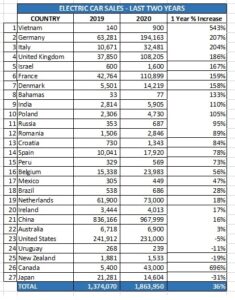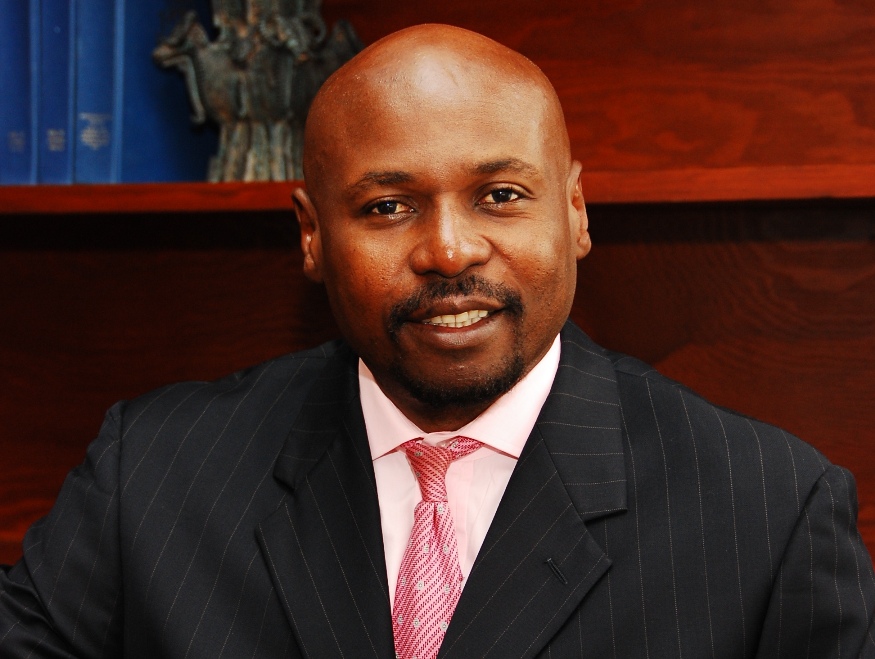September 28, 2021 – Germany has seen the world’s fastest growth in electric car sales of all major economies[1] during the pandemic, with sales more than trebling to 194,000 cars in 2020, up from just 63,000 in 2019, shows a study of electric car sales worldwide by UHY, the international accountancy network.
The 207% growth in electric car sales in Germany last year puts it first out of 27 countries[2] in UHY’s study. This was marginally ahead of Italy, which saw a rise of 204%, from 11,000 units sold in 2019 to 32,000 in 2020. The UK was in third place, with a sales increase of 186% in 2020, and The Bahamas showed a 133% increase. The average sales growth of EVs globally in 2020 was 36%.
Worldwide growth in sales of electric cars has outpaced global car sales (including petrol and diesel), which fell by approximately 15% to 64 million in 2020, down from 75 million in 2019.[3]
Less than a fifth (19%) of countries in UHY’s study saw sales of electric cars fall during the first year of lockdown.
UHY says that Germany has begun a program of heavy investment in electric vehicle charging infrastructure in order to achieve its target of having 10 million electric vehicles and one million charging stations on German roads by 2030. The country also has generous tax breaks and incentives for purchases of electric cars and charging points. New electric cars priced at less than 40,000 EUR benefit from a government rebate of 9,000 EUR, while the state-owned Development Bank offers a 900 EUR grant to install a private electric car charging point. In The Bahamas, the Bahamas Development Bank offers finance for commercial vehicles on favorable terms as attractive as no money down.
UHY Wahlen & Partner says that several new and updated mass-market electric vehicles were launched in the last year, including the Volkswagen ID.3 and e-Up! has triggered a new wave of sales in Germany. Battery electric cars made up 10% of all new cars sold in Germany in 2020, with fossil fuel-powered cars falling to a 78% share of new car sales.
Dennis Petri, Chair of UHY, comments: “The electric car revolution has picked up a lot of speed worldwide in the past year, despite the effects of the pandemic. Germany is a country with a long history of automotive innovation, and it looks like it will again be part of the vanguard in making electric cars a part of everyday life.”
“Many governments around the world have helped to drive the electric vehicle transition through providing subsidies for consumers who purchase EVs. Along with investing in the public charging infrastructure necessary to support electric cars, this is the biggest step governments can take to accelerate a large-scale switch to EVs.”
Thomas Wahlen, Managing Partner at UHY Wahlen & Partner, comments: “Manufacturers and the Government in Germany have both invested a great deal in accelerating the German transition to electric vehicles, and they will be hoping this growth rate continues for several more years.” John Bain, the Managing Partner at UHY Bain & Associates, added: “EVs have shown a significant year over year sales growth in The Bahamas. We support a further investment by the government of gradually changing its fleet to EVs that will lead to long-term savings over the life of the vehicle, as well as a reduction in the carbon footprint.”
Electric car sales growth continues to slow in China
UHY’s study shows that electric car sales growth in China continued to slow in the past year, with 968,000 battery-electric cars sold in 2020, a 16% increase on 836,000 sold in 2019. The growth rates in the previous two years had been 23% and 54%. China’s sales growth in 2020 placed it 21st on the table in UHY’s study.
However, China remains by some distance the largest national market in the world for electric cars, with more sales than the next four largest markets combined. Sales of electric cars in China are heavily incentivized by programs including Beijing’s ‘license lottery,’ which limits the city’s 22 million residents to only 40,000 new petrol cars per year to lower congestion and pollution.
US and Japan both saw electric car sales fell in 2020
UHY’s study also shows that both the US (23rd place, electric car sales down 5% in 2020) and Japan (27th place, electric car sales down 31% in 2020) both saw electric car sales fall in the past year. Less than 2% of new cars sold in the US in 2020 were battery electric vehicles.
Dennis Petri adds: “Electric cars in the US are still generally confined to the east and west coasts – that is thanks to the incentives offered by state governments in places like California, New York, and New Jersey. Car buyers in the rest of the country would benefit from more states following suit.”
Morito Saito, Director at UHY FAS Ltd, UHY’s member firm in Japan, comments: “Japanese car manufacturers still have a relatively limited offering when it comes to battery-electric cars even though they were very early adopters of hybrid technology. While some manufacturers in Europe are already implementing plans to produce only electric vehicles, that has not yet happened in Japan.”
1 Battery electric passenger cars only, excludes hybrids
2 Excluding those registering less than 1,000 electric car sales in 2020
3 Statista – number of cars sold worldwide
UHY Wahlen & Partner says that several new and updated mass-market electric vehicles were launched in the last year, including the Volkswagen ID.3 and e-Up! has triggered a new wave of sales in Germany. Battery electric cars made up 10% of all new cars sold in Germany in 2020, with fossil fuel-powered cars falling to a 78% share of new car sales.
Dennis Petri, Chair of UHY, comments: “The electric car revolution has picked up a lot of speed worldwide in the past year, despite the effects of the pandemic. Germany is a country with a long history of automotive innovation, and it looks like it will again be part of the vanguard in making electric cars a part of everyday life.”
“Many governments around the world have helped to drive the electric vehicle transition through providing subsidies for consumers who purchase EVs. Along with investing in the public charging infrastructure necessary to support electric cars, this is the biggest step governments can take to accelerate a large-scale switch to EVs.”
Thomas Wahlen, Managing Partner at UHY Wahlen & Partner, comments: “Manufacturers and the Government in Germany have both invested a great deal in accelerating the German transition to electric vehicles, and they will be hoping this growth rate continues for several more years.” John Bain, the Managing Partner at UHY Bain & Associates, added: “EVs have shown a significant year over year sales growth in The Bahamas. We support a further investment by the government of gradually changing its fleet to EVs that will lead to long-term savings over the life of the vehicle, as well as a reduction in the carbon footprint.”
Electric car sales growth continues to slow in China
UHY’s study shows that electric car sales growth in China continued to slow in the past year, with 968,000 battery-electric cars sold in 2020, a 16% increase on 836,000 sold in 2019. The growth rates in the previous two years had been 23% and 54%. China’s sales growth in 2020 placed it 21st on the table in UHY’s study.
However, China remains by some distance the largest national market in the world for electric cars, with more sales than the next four largest markets combined. Sales of electric cars in China are heavily incentivized by programs including Beijing’s ‘license lottery,’ which limits the city’s 22 million residents to only 40,000 new petrol cars per year to lower congestion and pollution.
US and Japan both saw electric car sales fell in 2020
UHY’s study also shows that both the US (23rd place, electric car sales down 5% in 2020) and Japan (27th place, electric car sales down 31% in 2020) both saw electric car sales fall in the past year. Less than 2% of new cars sold in the US in 2020 were battery electric vehicles.
Dennis Petri adds: “Electric cars in the US are still generally confined to the east and west coasts – that is thanks to the incentives offered by state governments in places like California, New York, and New Jersey. Car buyers in the rest of the country would benefit from more states following suit.”
Morito Saito, Director at UHY FAS Ltd, UHY’s member firm in Japan, comments: “Japanese car manufacturers still have a relatively limited offering when it comes to battery-electric cars even though they were very early adopters of hybrid technology. While some manufacturers in Europe are already implementing plans to produce only electric vehicles, that has not yet happened in Japan.”



 News5 days ago
News5 days ago
 News1 week ago
News1 week ago
 Caribbean News6 days ago
Caribbean News6 days ago
 News5 days ago
News5 days ago














